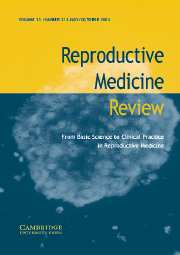Article contents
Selective estrogen receptor modulators (SERMs) in postmenopausal women's health
Published online by Cambridge University Press: 13 February 2001
Abstract
Over the past ten years mortality for breast cancer in the UK has been falling. The decrement has been more substantial in the 20 to 69 age group, which has seen a 22% decrease, while in the 70 to 79 age group the decrease has been milder at 12%. The incidence of the disease, however, is increasing and many women have a relative or friend with a disease that they perceive to be extremely mutilating. Fear of breast cancer is such among women that it is mistakenly viewed as the most common cause of death in females. Postmenopausal hormone replacement therapy (HRT) has many benefits and is particularly effective in the prevention of osteoporosis. But, to obtain this effect, HRT has to be continued for many years and long-term treatment has been shown to slightly increase the risk of breast cancer. This fact forcefully stimulated the imagination of both press and public alike.
- Type
- Research Article
- Information
- Copyright
- © 2000 Cambridge University Press
- 2
- Cited by




